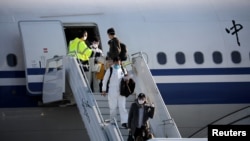Planeloads of Chinese medical supplies, doctors and quarantine specialists have begun landing in European capitals on an almost daily basis, prompting some analysts to worry the humanitarian effort will ultimately give Beijing greater economic and political leverage over the European Union.
Government leaders in the hardest-hit countries — Italy and Spain — have openly welcomed China's help. Spanish Prime Minister Pedro Sanchez said he would "draw from China's experience" when he announced a state of emergency that confines the population for one month.
Other European leaders have been more tepid. Germany's Angela Merkel described the aid as "reciprocity" for relief assistance Europe provided China when the coronavirus swept through Wuhan province earlier in the year, infecting and killing tens of thousands of people.
Some analysts see the Chinese outreach as a bid to repair Beijing's image after its missteps and secrecy early in the Wuhan outbreak allowed the contagion to spread. But with health services overstretched, European leaders are in no position to turn down the assistance.
Still, the long-term economic consequences could be significant.
"As Europe reels from coronavirus, China is already well on the way to recovery, getting economic production back up," said Evan Ellis, a specialist in asymmetrical warfare at the U.S. Army War College and an analyst on Chinese international policies with the U.S. Department of State.
"China could end up bailing out a lot of Europe's financial institutions that will be swamped with debt from massive public expenditures required to deal with the epidemic," said Ellis. "They will use the leverage to move on strategic sectors, mainly high tech and telecommunications."
China helped finance Europe's recovery from the 2008 recession, acquiring large portions of public debt in Italy, Spain and some east European countries. The EU has a $230 billion trade deficit with China, which has invested in infrastructure projects in Italy, Greece and Portugal.
Some aid has arrived in the form of donations from Chinese tech giant Huawei, which seeks to become the principle provider of equipment for 5G telecom networks, despite U.S. pressure on European governments to exclude them.
Analysts say Europe may have little choice but to accept economic dependence on China, despite widespread distrust of its single-party political system, which has been blamed for mistakes and cover-ups that allowed the coronavirus pandemic to get a foothold.
The Chinese government acted indignantly to an article in Spanish newspaper El Pais by Nobel Prize laureate Mario Vargas Llosa, who criticized China's ruling communist party for silencing a doctor who warned of a pandemic when the first infections started in Wuhan.
Vargas Llosa's books have been banned from Chinese bookstores, and he has been officially attacked for "irresponsible statements."
Hungarian billionaire George Soros has called on European governments to cancel a China-EU summit planned for later this year in order to deny Chinese President Xi Jinping a "political victory."
France, Sweden and Germany have issued statements warning that China's authoritarian system is incompatible with EU institutions.
In Italy, the most severely hit country in Europe, 50 Cuban doctors and Russian medical units have joined a growing number of Chinese doctors working with health authorities.
Chinese Red Cross Vice President Sun Shuopeng last week criticized the Italian government for "laxity" in applying the extreme lockdown measures advised by China.
"I can see public transport is still running, people are still moving around, having gatherings in hotels, and they are not wearing masks," Sun said. Subsequently, Prime Minister Giuseppe Conte announced tighter restrictions on people's mobility and a shutdown of all production.
Britain and the Netherlands have been trying to implement a less drastic strategy, aimed at isolating sectors of the population most vulnerable to infection rather than paralyzing social and economic activity as a whole.
China has criticized that approach as "Social Darwinism."








